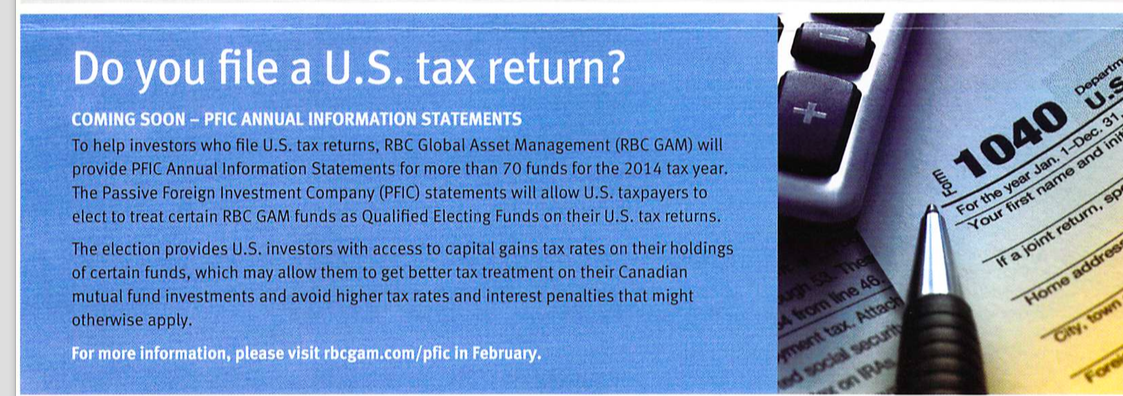TORONTO, November 5, 2014 – RBC Global Asset Management Inc. (RBC GAM Inc.) today announced that Passive Foreign Investment Company (PFIC) Annual Information Statements will be made available to U.S. taxpayer clients holding certain Canadian-domiciled funds that are part of the RBC GAM fund families. These statements will be available on more than 70 RBC Funds, PH&N Funds and RBC Private Pools (RBC GAM funds) for the 2014 tax year.
“As part of our continued effort to meet the evolving needs of our clients, we are pleased to provide PFIC reporting on a wide range of our investment solutions,” said Doug Coulter, president of RBC GAM Inc. “With this reporting available on more than 70 funds and private pools offered by RBC GAM Inc., investors have a robust line-up of options that provide them with the ability to apply the appropriate tax rules to their investments according to their status as U.S. taxpayers.”
The PFIC reports issued by RBC GAM Inc. will provide U.S. taxpayers with the option to elect to treat certain RBC GAM funds as Qualifying Electing Funds (QEFs) on their U.S. tax returns. This allows U.S. investors access to capital gains tax rates on their holdings of these funds and prevents the application of certain amounts of tax deficiency interest penalties.
For more information and to access the full list of RBC GAM funds that will have PFIC reporting, please visit: RBC Global Asset Management – Passive Foreign Investment Company
More information on how to access PFIC Annual Information Statements for RBC GAM funds will be communicated in early 2015.









Example please. Sounds like get out PFIC treatment – capital gains instead of ordinary gains? Or, just information more along the lines of US requirements, to help reporting on PFIC?
I got that memo from RBC on a pamphlet inside a RRSP statement a month ago or so. I threw it in the garbage.
QEF funds would with an election via 8621 be treated just like domestic US funds. This would be very good news for holders but they would have to de-taint their funds if they already held them before the statements.
US persons could more easily hold these funds. Not having to file 8621 to get what should be the default for a QEF would be a step in the right direction as well.
I meant ‘detaint’ their funds. They would have to do a fake sale and pay prior PFIC taxes to elect into QEF.
My husband and I have been invested in these for about a year now and were sanctioned by our lawyer. So far so good.
Isaac Brock society mentioned in article in Philippines!
http://business.inquirer.net/187213/us-foreign-account-rules-raise-concerns
I think this sort of fund statement to help with PFIC reporting pre-dates FATCA, and is not at all a trick to expose US persons for FATCA purposes. Of course, the government should fix the tax treaty instead.
Financial institutions continue to make their own publicity regarding FATCA. It’s all good PR that something needs to be done.
Sounds like a good way to encourage the really-USA people to invest in a Canadian institution. Another way to do so, would be an agreement that says, if the Canadian bank reports an account under FATCA, then the depositor does not have to report it. Plenty of really-USA persons visiting Canada are unaware that they can do anything more than exchange currency in a Canadian bank.
Not that it will do much but, I’ve just struck my own little blow against this FATCA.
“Foreign Account Tax Compliance Act
Due to the Foreign Account Tax Compliance Act and its ramifications world-wide, Falconrose Photography has ceased doing business with all American-based suppliers. FalconRose Photography will patronize Canadian suppliers and retailers of photographic equipment.
Also, this will result in sales of images to United States purchasers treated as if the purchase had taken place in the Province of British Columbia, Canada, and that all such provincial and federal sales taxes due will be paid by the purchaser (due to the complicated tax process involved, point of sale cannot be specified at location of purchaser.)
We are a small Canadian company and as such, we have had to take measures to protect ourselves from United States Taxation and its complicated methods of filing taxes under the United States Tax Code.”
If anybody from the United States purchases images from me, they will have to pay Federal Sales Tax and Provincial Sales Tax. Fore-warning them in advance.
I wonder if that Canadian bank is RBC?
http://www.relocatemagazine.com/news/david-sapsted-02-2015-suddenly-expats-in-the-us-have-little-to-bank-on
@The_Animal, is this your company, or do you work for this company (Falconrose)?
“We are also boycotting any United States shooting locations and will proceed to shooting schedules in Canada only. Canada is a vast and beautiful country and there are plenty of places to photograph without having to step outside it. We look forward to continuing to bring beautiful images of Canada’s wildlife and landscapes for your viewing pleasure.”
This is my company. I own it, my wife and I are the photographers.
So, hedge funds get to buy foreign insurance companies without hitting PFIC rules, but humans don’t get to buy foreign mutual funds
https://www.federalregister.gov/articles/2015/04/24/2015-09630/exception-from-passive-income-for-certain-foreign-insurance-companies